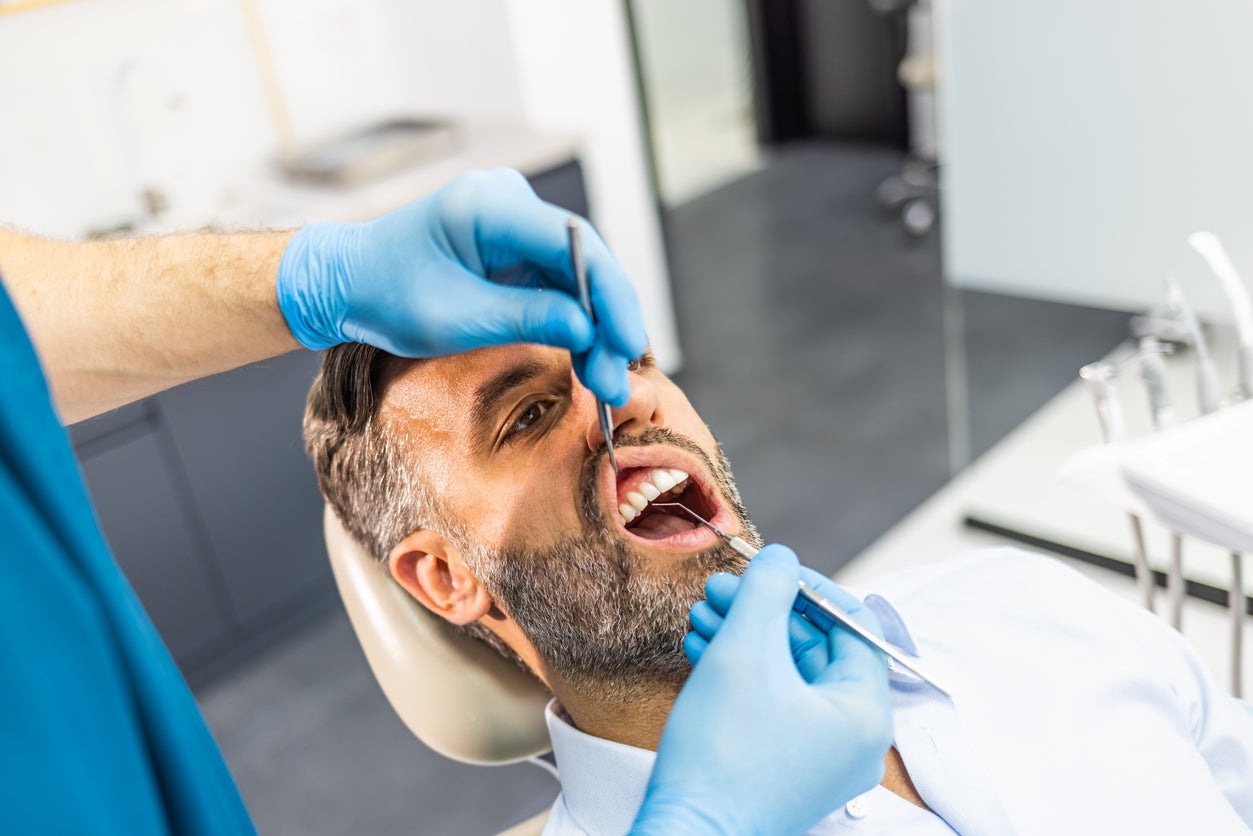ARTICLE AD BOX
It’s official – Americans spent the same amount of money on weight loss injections as the country’s entire foreign aid budget in 2023. According to a study by the American Medical Association and the Centers for Disease Control, the figure spent on GLP-1 drugs – so named because they mimic the effects of a naturally occurring hormone called glucagon-like peptide-1 to lower blood sugar – hit a staggering $71bn. In the UK, research released in January 2025 and reported by the Telegraph revealed that more than one in 10 women are on the jabs in total, while an estimated 500,000 people are signed up to Mounjaro or Wegovy on a private prescription.
As the takeup of these drugs, acquired via both the NHS and off-label prescriptions, continues on an ever-upward trajectory, more concerns are being raised about potential long-term side effects. A possible link with a deterioration in bone health and skeletal muscle mass has been flagged, with Dr Doug Lucas, a trauma and orthopaedic surgeon and director of education and training for Screen My Bones, calling it potentially “catastrophic” and “frightening”. Meanwhile, a large-scale study found that those taking GLP-1s were nearly 2.5 times more likely to develop drug-induced acute pancreatitis, a serious condition where the pancreas becomes inflamed.
Now, another warning has raised its head. Forget “Ozempic face”, the colloquial term for ageing and sagging facial skin, deepened lines or hollowed cheeks associated with rapid weight loss – should we be worrying about the even more unpleasant-sounding “Ozempic teeth”?
First off, it’s important to note that the moniker is misleading. Ozempic, a specific brand of the drug semaglutide, often gets used as the shorthand for all GLP-1s – primarily because it’s the most well-known name that’s dominated media coverage since the rapid rise in jabs’ popularity. But in the UK, it’s not licensed for weight loss, only the treatment of type 2 diabetes. Semaglutide is available for private prescription for weight loss under the Wegovy brand, alongside two other GLP-1s: Mounjaro (a brand of tirzepatide) and Saxenda (a brand of liraglutide).
All these drugs come with potential side effects, some of which could have consequences on oral health – hence the nicknames “Ozempic teeth” and “Ozempic mouth”. Research is in its infancy, and the long-term ramifications are yet to be established; as with other health outcomes and GLP-1s, the data simply isn’t there yet, according to the British Dental Association (BDA). “With these drugs, the long-term dental data is missing, so it’s premature to consider ‘Ozempic mouth’ as a definite ‘thing’,” explains the BDA’s scientific adviser, Dr Praveen Sharma, an associate professor and honorary consultant in restorative dentistry at the University of Birmingham.
Similarly, in an article penned by dental hygienist Anne Symons and published in the British Dental Nurses’ Journal (BDNJ), she outlines that “there is not sufficient evidence to suggest that semaglutide solutions such as Ozempic or Wegovy have a direct connection to oral health”. However, common side effects and impacts can have knock-on effects “and must be considered”, she continues. Sharma also acknowledges the connection between the mouth and body. Data or no, the fairly common side effect of xerostomia, aka dry mouth, has been noted by users. “Saliva plays a vital role in maintaining the health of our teeth and gums, so a reduction in the salivary flow would, in theory at least, have a detrimental effect on the oral cavity,” concludes Sharma.
Novo Nordisk, which manufactures Ozempic, Wegovy and Saxenda, and Eli Lilly, which manufactures Mounjaro, both stress that patient safety is their top priority, and that they actively collect, monitor and report safety data and information on their medicines, including reports of adverse drug reactions.

Wider awareness seems to be growing around potential oral issues, with Google Trends data showing that searches for “Ozempic teeth” have nearly doubled over the past week. Dr Tim Bradstock-Smith, founder and principal dentist at The London Smile Clinic, says that as more patients turn to medications like Ozempic, he’s seeing “a new set of oral and facial health considerations – commonly referred to as ‘Ozempic mouth’ and ‘Ozempic face’.” Although so far the practice has only observed “mild oral symptoms”, he says that some patients may report suffering from dry mouth, altered taste and increased gum recession or tooth sensitivity. “While the medication itself isn’t directly harmful to the teeth, side effects – particularly dry mouth – can heighten the risk of decay, enamel erosion, and gum disease if not carefully managed,” he adds.
Dr Sofina Ahmed from Viva Dental has raised a number of different oral health issues that could be provoked by GLP-1s, some expected and others more surprising. On top of dry mouth, she also highlights the risk of increased tooth sensitivity. “Many weight loss injectable users report heightened pain and tenderness when consuming cold, hot, and sweet foods,” she says. “If not treated correctly, this may cause enamel erosion or receding gums, which take back the inner layers of the tooth, making it more sensitive.”
Ahmed also warns of potential receding gums as they shrink in line with rapid weight loss, alongside fat pads in the cheeks and around the jawline. “This loss of overall structure can impact how dentures or veneers fit, leading to long-term functional and cosmetic dental problems,” she adds.
Bad breath is another known side effect of weight loss injections, leading to the term “Ozempic breath” gaining traction. Symons cites a study on animals, which found that GLP-1s slowed digestion, leading to the creation of volatile sulphur compounds produced by gut bacteria. “These play a significant role in malodorous gas production,” she said. “Professionals may be able to help by recommending or providing oral hygiene adjuncts that mask and eliminate the odour, such as an effective mouthwash.”
Side effects such as dry mouth can heighten the risk of decay, enamel erosion, and gum disease
Dr Tim Bradstock-Smith, founder and principal dentist at The London Smile Clinic
But one of the most troubling impacts on dental care is vomiting. Feeling nauseous and being sick are listed as possible side effects for every weight loss injection currently on the market in the UK. Research has shown that the most common adverse effects with GLP-1s are all gastrointestinal (nausea, vomiting, and diarrhoea) and up to 19 per cent of people experienced vomiting as a result of taking the drugs in some trials. A study of 2.4 million Americans with type 2 diabetes published in January identified that, while those on GLP-1s had a lower risk of developing 42 different diseases, they had a higher risk of 19 side effects or diseases. One of these was nausea and vomiting: patients were 30 per cent more likely to develop these symptoms.
Throwing up regularly, as well as being distressing, can have a serious impact on the teeth. “The stomach is very acidic, and if the patients are having that acid come up into their mouth, then it really is quite damaging to the teeth,” says Dr Victoria Holden, a member of the British Association of Private Dentistry. “So you can get a problem called dental erosion, where, literally, it’s like a chemical dissolution of the enamel of your teeth – it can be quite aggressive.” She calls it potentially “one of the more serious complications” or side effects of weight loss drugs on oral health. “If a patient is suffering from reflux, they should definitely be getting that looked at, because solving that problem from the point of view of rebuilding teeth that have been damaged by acids is complicated and expensive.”
Holden also highlights another, more surprising consideration: nutrition. “Losing weight rapidly can lead to vitamin deficiencies,” she explains, adding that B12 and zinc are commonly low in patients who aren’t eating a lot. “Making sure that those minerals and vitamins are all at the optimal levels is going to help patients in terms of symptoms of sore mouth and oral perception problems – the bad sensory changes that they get in the mouth.”
For those on weight loss or diabetes injections who have noticed oral side effects – whether it be dry mouth, reflux, halitosis (bad breath) or heightened tooth sensitivity – Holden recommends consulting with your dentist, and always informing them if you’ve started on a new medication. All of the experts stress the importance of staying well hydrated, specifically drinking lots of water (and avoiding acidic drinks), to combat ill effects; dry mouth can also be treated with saliva substitutes, such as lozenges, gums or sprays. “Avoid acidic, sugary foods or overly processed snacks that can cause enamel erosion and harmful bacteria,” recommends Ahmed. “Instead, try crunchy fruits and vegetables like apples and celery to help with natural cleaning and saliva flow.”

Ultimately, GLP-1s can have huge health benefits for plenty of users, including reducing the risk of cardiac arrest and increasing life expectancy. As Bradstock-Smith puts it, “In our experience, the overall health benefits of these medications often outweigh the manageable side effects when addressed with the right care.”
But Holden is hopeful that at some point medical practitioners will join the dots and take a more holistic approach when prescribing Ozempic et al. “There’s a route for the medical field – that doctors or people who are prescribing these drugs to comment to patients that they should see the dentist or the hygienist before starting treatment,” she says. There’s already precedent for this; dentists began noticing that patients who were taking bisphosphonate drugs, prescribed for people with bone problems like osteoporosis and some types of cancers, weren’t healing well after tooth extractions.
Many weight loss injectable users report heightened pain and tenderness when consuming cold, hot, and sweet foods
Dr Sofina Ahmed
“We’ve gone from a bit of denial in the medical field about there being a problem with that to patients now being actively encouraged to see the dentist before they start a programme,” adds Holden. “And if we’ve got a similar thing going on with Ozempic, where potentially the outcomes can be quite damaging to the teeth and gum condition, and we know about it beforehand, we can check that the patients are in optimum dental health before problems arise.”
A Novo Nordisk spokesperson tells The Independent: “We recommend patients take these medications for their approved indications and under the supervision of a healthcare professional,” adding, “We recommend that any patient experiencing side effects while taking GLP-1 receptor agonists including Wegovy and Ozempic (semaglutide injection) report them to their healthcare provider and via the MHRA Yellow Card scheme: yellowcard.mhra.gov.uk.”
An Eli Lilly spokesperson advised: “Mounjaro should only be used when prescribed by a healthcare professional, and prescriptions should be fulfilled and supplied by registered pharmacies and providers. We encourage patients to consult their doctor or other healthcare professional to discuss any possible side effects they may be experiencing and to ensure that they are getting genuine Lilly medicine.”









 English (US) ·
English (US) ·